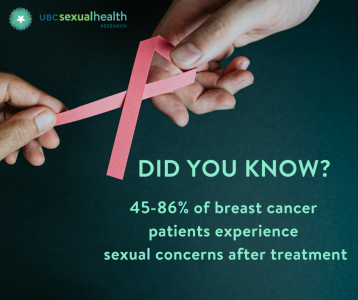
Addressing Sexual Concerns After Breast Cancer Treatment
Background
Breast cancer is a battle that countless women have to face. With a 5-year survival rate of 87% in Canada and advances in treatment options, survivorship concerns become more and more prioritized. A breast cancer diagnosis and the treatment following are life-changing in several ways and impact not only the patient but also on their surroundings. One critical issue that often remains shrouded in silence relates to sex. It is the finding that sexual difficulties can begin during breast cancer treatment and can persist long into survivorship. Here we share results of a recent study conducted by UBC Sexual Health Research on this important topic.
The Silent Struggle: Sexual Difficulties After Breast Cancer
Sexual difficulties are prevalent and can be deeply distressing for breast cancer patients and survivors. Over half of breast cancer survivors experience ongoing difficulties with sexual desire, sexual arousal, sexual distress or genital pain following treatment. Some studies even report that up to 86% of survivors face difficulties in this area.
Despite the high frequency of sexual concerns, it can be uncomfortable or embarrassing for cancer patients to discuss these issues with their doctor or partner. Many survivors suffer in silence, unaware of available help or hesitant to seek it.
However, the silence surrounding sexual problems can have profound consequences as sexual difficulties can persist and continue to impact quality of life and relationships. \ It is crucial to break the silence and provide support for those facing these challenges.
Why are Sexual Difficulties so Common after Breast Cancer Treatment?
Different types of cancer treatment can be responsible for the range of sexual health issues that women face.
For example, tamoxifen, which acts to antagonize (or block) estrogen at its receptor, can have an impact on sexual function. Side effects of chemotherapy include nausea, hair loss and fatigue, which can alter a person’s sense of sexual attractiveness. Chemotherapy can cause premature menopause, and also vaginal dryness and bleeding, which makes intercourse painful. Painful experiences during sex can trigger fear and avoidance of sex. Some also talk about not feeling like themselves in many areas of their lives.
Treatment Options
Although there are two Health Canada approved treatments for low desire in women, there is limited evidence that they are helpful for sexual concerns after breast cancer. Research in the UBC Sexual Health Research lab has been focused on non-pharmacological (i.e., non-drug) and non-hormonal remedies to these sexual health changes.
Earlier research shows that mindfulness-based approaches as well as supportive sex education (when delivered in groups) can be effective in treating low sexual desire in women without cancer.
Empowering Breast Cancer Survivors: Mindfulness-based treatment for sexual difficulties following breast cancer (BREAST study)
Our recent study, the BREAST study, aimed to help breast cancer survivors address distressing sexual changes after their cancer treatment. Our study compared two effective treatments – an online mindfulness-based group therapy and an online sexuality education intervention – in addressing difficulties with sexual desire, sexual arousal, sexual distress and genital pain.
Mindfulness-based treatments use an acceptance-based approach to encourage present-focused and non-judgmental attention. Sexuality education focuses on sharing accurate information about aspects which facilitate sexual health and inhibit sexual distress or pain.
We found significant improvements in sexual desire, sexual distress, and vaginal pain for both treatment options. Moreover, improvements were sustained for 6 months. The study was funded by the Canadian Cancer Society.
Mindfulness: A Promising Path
Mindfulness worked, and it is a simple, but not easy practice. It does not require elaborate equipment or pharmaceutical prescriptions, making it accessible to a broad range of individuals. Patients can readily integrate mindfulness techniques into their daily routines, offering a sense of autonomy and control over their well-being. Mindfulness practices, such as focused attention on the breath or body sensations, can also be incorporated into daily life, whether it’s during a quiet moment at home or a brief pause during a hectic day. This flexibility empowers affected people to take charge of their own healing journey.
Seeking Help and Resources
If you or someone you know is a breast cancer patient or survivor facing sexual difficulties, there is no shame in seeking help and support. Remember, you’re not alone, and there are resources available:
– Reach out to your healthcare provider to discuss your concerns and explore treatment options.
– Consider mindfulness-based therapy or other psychological treatments.
– Connect with support groups for breast cancer survivors to share experiences and advice.
– Utilize online resources and educational materials from reputable sources such as breast cancer organizations, medical centers, and sexual health websites.
This comprehensive guide to mindfulness created by BC Cancer can be a good start: https://bccancer.libguides.com/ld.php?content_id=36775815
The Principal Investigator is Dr. Lori Brotto, Professor, UBC Department of Obstetrics & Gynaecology. @DrLoriBrotto.